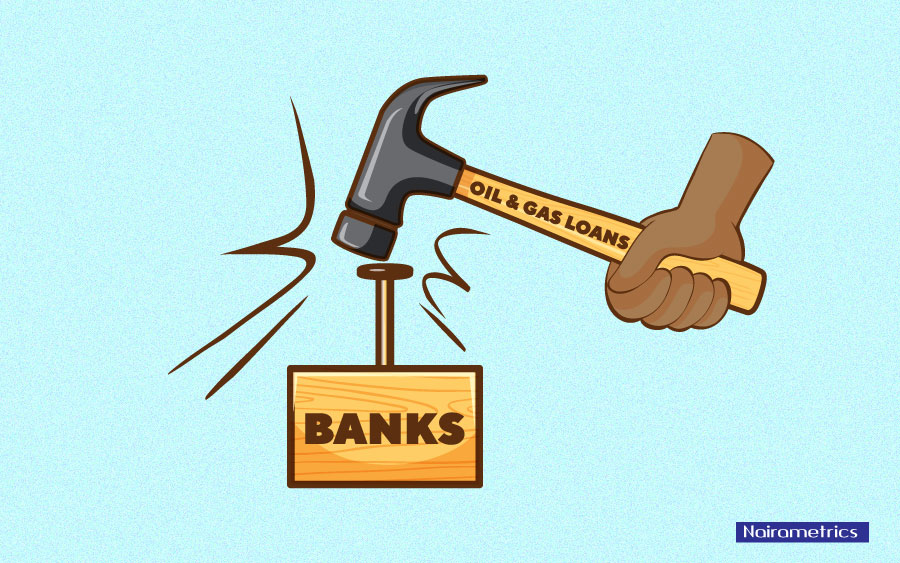Recently, there has been growing media speculations over the possibility that Nigerian banks might become adversely affected by the prevalent global oil crisis.
One article by Nairametrics had declared that banks were at risk due to the perceived inability of indigenous oil companies to repay their loans. While this worry is not entirely without merit, some experts who spoke to Nairametrics have assured that the situation is not as serious as some people believe it to be.
Banks they claim, have learnt from the lessons of the 2015-2016 oil crisis and took bold steps to mitigate against their downside risks.
READ MORE: Updated: CBN debits banks N1.4 trillion for failing to meet CRR targets.
What the experts are saying
According to the Director of Sales at Chapel Hill Denham, Lanre Buluro, banks’ loans to the oil and gas sector are really not as bad as people think. As a matter of fact, debts owed by the upstream oil sector (which is directly involved in crude exploration and has, unfortunately, been hit hard by the global oil price slump), only represent about 19%-25% of banks’ loan books.
In his emailed response to Nairametrics’ inquiries, Buluro said:
“The oil & gas book in banks is not as bad as people think, particularly the upstream subsector. The upstream book is about 19%-25% of loans. Of course, given the current environment, there is a concern. From our talks with management, they are watching the situation.”
Measures are in place to handle the situation
Buluro further explained that some lenders already have measures in place aimed at mitigating the adverse effects of any possible oil price crash.
One of such measures entails hedging production at $45 per barrel as part of the loan terms. With this hedge in place, oil companies are bound to meet their loan obligations despite the recent downturns.
An earlier analysis by Nairametrics Research listed out the names of the banks that did this.
(READ THIS: Moody’s changes outlook on the Nigerian banking sector to negative)
“In the meantime, some companies (banks) have already begun to slash their CAPEX and will most likely cut dividend payouts in 2020,” Buluro disclosed.
These moves are expected to generally help them to manage their costs of operation, as they try to cope with the harsh economic challenges posed by recent global events.
Buluro also highlighted other measures some of them might be taking to protect themselves. He said:
“The good banks will take prudent measures and take provisions (eg. GTBank and Stanbic IBTC). If the risk doesn’t crystalize, it will be a written back which is accretive for earnings. And in the event some borrowers struggle, banks will restructure the loans – defer principal payments, elongate tenure.”
Should banks consider lending less to the oil and gas sector?
Bearing in mind that this is not the first time Nigerian banks have had to grapple with this kind of challenge due to their exposure to the oil and gas sector, we wanted to find out if it is high time banks rethought their lending to the sector. In other words, should they, perhaps, consider lending less to oil and gas companies going forward? Mr. Buluro does not think this is possible.
READ ALSO: Fitch rates 3 Nigerian banks lower to ‘B’, places others on negative watch
“In terms of lending less to the sector, it is impossible. The sector is a critical part of the economy. While its 9% of GDP, it is still responsible for 90% of USD revenue for the govt. There are strong names in the sector with considerable reserves (most loans are reserve-based lending).
“Also, banks have a dollar book and have to lend dollars, so the oil & gas sector is a prime customer for those dollars. There are other portions of the bank loan books that are riskier (retail, manufacturing, and general commerce) and have bigger NPL implications.
“Note that banks have learnt their lessons from the past and are structuring loans with a better understanding of the risks,” he said.
Similarly, a former banker and the Principal Consultant at Hatytude Consultancy Services Limited, Femi Hassan, said he does not think “the oil price crash will necessarily determine how banks will lend to the oil companies going forward.” This is because most banks have learnt from past events and are now more careful by introducing hedges when lending.
READ ALSO: Banks’ loans to Oil and Gas, Power, other sectors drop by N411.8 billion
Latest results from Nigerian banks largely indicate higher profits as the effect of the Coronavirus induced lockdowns is yet to be captured. However, it is expected that Q2 results will come under significant strain as banks recalibrate their loan books and assess their cost. Some banks have already taken bold steps by cutting down on payroll costs. Access Bank recently announced a 40% slash in payroll cost.
The banking index of the Nigerian Stock Exchange gained 15% in April, perhaps an indication that investors see a bright spot amidst the doom and gloom. Time will tell whether the light will remain as bright.













